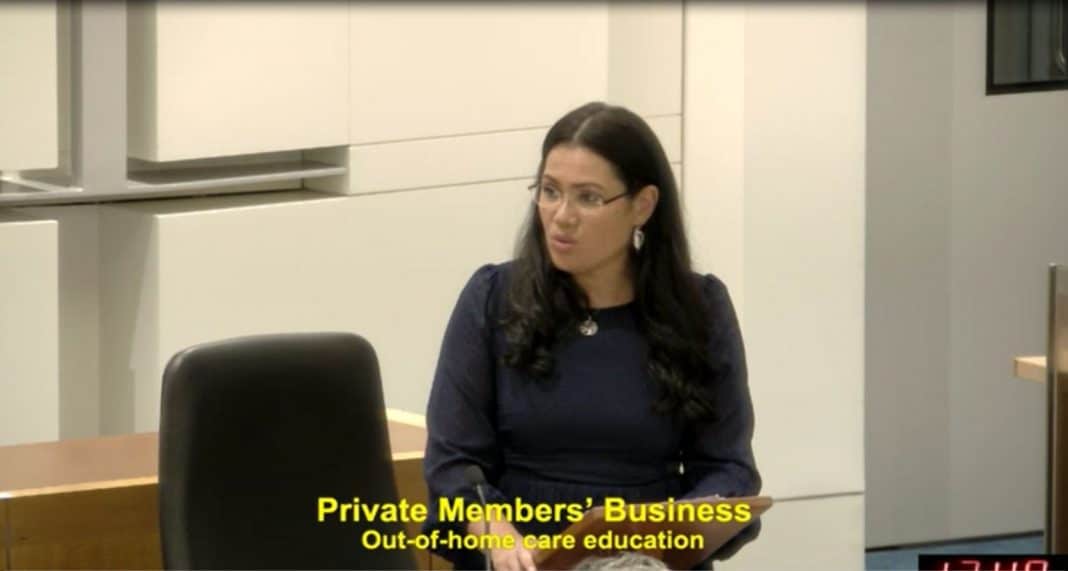Children in residential care have poorer educational outcomes than their peers – but Liberal MLA Elizabeth Kikkert believes an award-winning Victorian program could hold the answer.
Children and young people in out-of-home care were less likely to attend school or be engaged with learning, Mrs Kikkert said in the Legislative Assembly this week. Many did not continue school beyond minimum school leaver age (17), and their levels of numeracy and literacy were low.
In the ACT, according to a 2019 KPMG evaluation, 20% of children in care did not meet the minimum standard for reading, and 13% did not meet the minimum standard for numeracy – three times higher than their peers.
“Youth workers have shared with me two specific concerns,” Mrs Kikkert said. “First, that so many kids in residential care are disengaged from or struggling with learning. Second – and maybe more important – that they lack the confidence and capacity to help these kids re-engage or learn better.
“In short, they want to help. They know it is an important part of their role as residential care workers. But they don’t know what works best, what doesn’t, or how exactly to go about it.”
Mrs Kikkert noted that the ACT Government’s out-of-home care strategy acknowledged many of the issues that she had raised; its Joint Education and Training Pathways Initiative encouraged attendance, notified child protection staff of absenteeism, and made sure each child had an individual learning plan.
“These are all good things,” Mrs Kikkert said. “The question remains whether this is enough. Youth workers who have shared their concerns with me emphatically state that it is not.”
Listening to youth workers, Mrs Kikkert said she realised that carers needed more support and training to help their children learn; and assistance from experts to help children re-engage with school and learn better.
Anglicare Victoria’s TEACHaR program provided exactly what youth workers state they need, Mrs Kikkert said. Children doubled their engagement with learning, and twice as many children reached average overall academic achievement. The Victorian Government is replacing its Children in Residential Care educational support program with one based on this.
Mrs Kikkert proposed that the ACT Government review Anglicare’s an award-winning Victorian youth education program and explore ways a similar program could be made available here.
Rachel Stephen-Smith, Minister for Health, Families and Community Services, said the government supported Mrs Kikkert’s motion. “It goes to the very important issue of how we best provide holistic support to children and young people in out-of-home care, or in youth detention.”
The Anglicare model could be incorporated into the future of the ACT’s out-of-home care system, Ms Stephen-Smith said. The government was designing the next iteration of its Step Up for Our Kids strategy; the minister would report to the Assembly later this year on how matters raised in this motion could inform that work. TEACHaR, Ms Stephen-Smith noted, was a broad program of support; it also targeted children disengaging from education who were not in care.
However, poor educational attainment was not caused by out-of-home care, Ms Stephen-Smith and Emma Davidson, Minister for Justice Health, said. Many children and young people in out-of-home care had experienced significant trauma through abuse or neglect, which impacted their education; by the time children entered Bimberi Youth Justice Centre, their education had already been disrupted.
Child Youth Protection Services worked with ACT schools to ensure no child in the Director-General’s care was educationally disadvantaged because of living in out-of-home care. All young people at Bimberi, attended Murrumbidgee Regional High School, Griffith, which helped children transition back to school. It was important that education and youth workers had separate but collaborative and complementary roles, Ms Davidson said: teachers to educate, youth workers to focus on other essential social and wellbeing supports.
Ms Stephen-Smith made one amendment. Mrs Kikkert had wanted the ACT Government to “ensure that staff in residential care homes and Bimberi Youth Justice Centre received ongoing training and support”. In Ms Stephen-Smith’s substitution, the Government will “explore ways to improve support”.
Mrs Kikkert’s clause was very specific, Ms Stephen-Smith explained; it would require staff to receive training focusing on literacy and numeracy, but the role of youth workers was quite varied. Literacy and numeracy might not be the most appropriate things for some children and young people to focus on, rather than re-engaging with education. This amendment “broadened the call”, Ms Stephen-Smith said.
Although pleased Labor and Greens members supported most of her proposal, Mrs Kikkert was not satisfied with this amendment.
“To be blunt, exploring something is far different from ensuring that it happens,” she said.
“Will anything meaningful actually happen? Will kids in care continue to not receive support in learning because this government is vomiting out words of declaration and not words of commitment? Will carers continue to watch helplessly as they are not given appropriate training as a matter of urgency?”



